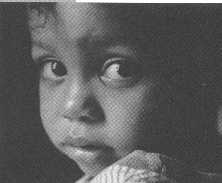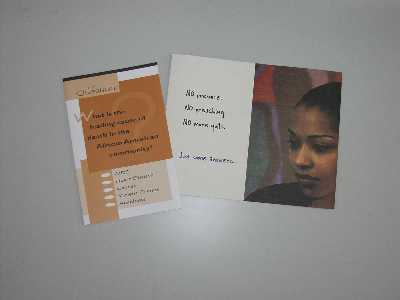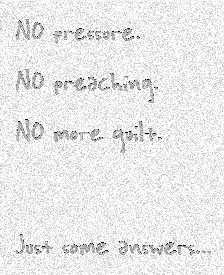Think of the people you know who are actively pro-life. How many of them are African Americans? Can you count them on one hand? Can you count even one? These are questions we in the pro-life movement need to be asking ourselves. There are a few pro-life entities consisting of African Americans, and there have been isolated attempts by pro-life groups to engage Americans of color in an effort to protect unborn life. However, we have yet to see a concerted, grassroots pro-life effort to educate the black community about abortion, as well as recruiting them to labor with us on behalf of unborn babies.
The effect abortion is having on the African American community is devastating. Sadly, this information remains widely unknown by Americans, black or white.
What is the leading cause of death in the African American community? Most will likely guess AIDS, heart disease, cancer or violent crime. The truth is that more African Americans have been killed by abortion since 1973 (over 13 million) than the total number of deaths from all other causes combined. These statistics are not pro-life rhetoric; they originate from the US Center for Disease Control.
Here are some other facts you may not know:
35% of abortions in the United States are performed on African American women, while they represent only 12% of the female population of the country. (Source, US Center for Disease Control and the US Census
Bureau.)
The National Vital Statistics Reports, Volume 48, Number 11, indicates the abortion rate among married African American women is more than 4.5 times greater than it is among married white women.
According to the 2000 Census, Hispanics have replaced African Americans as the largest minority group in the US. The loss of 13 million African American children through abortion has played a significant part in this population decline.
Abortion services have been deliberately and systematically targeted toward African Americans. A disproportionate number of the nations abortion clinics are located in minority neighborhoods.
The racist implication of these statistics is alarming and should make people in both the black and white communities sit up and take notice. These facts are included in one of the two new brochures produced by Dayton, Ohio, Right to Life as part of a long-term strategy to reach the African American population.
Peggy Lehner, President of Dayton Right to Life, spearheaded the research and development of this new literature. ”We have done very little, if anything, to educate black Americans about abortions impact on them as a race,” said Peggy. We want to educate and inspire African Americans to come forward and assume the leadership in reaching the black population.
Considerable effort has gone into this budding strategy. The initial research was conducted by the Center for Business and Economic Research at the University of Dayton. They conducted two focus groups, one with black women from a lower economic and educational status, a second with black women representing a higher economic and educational point-of-view. They were questioned on their position on abortion, as well as their view of the pro-life movement and Planned Parenthood. In addition, they were shown existing pro-life literature and asked for their feedback. The researchers also did an extensive study of sociological literature and research relating to blacks and abortion.
Over the next year, two separate black consultants were hired to assist with a series of focus groups and individual interviews of African Americans. These focus group included people who held a wide range of opinions on the issues and included teens, parents, single moms and a number of pastors of black churches in the community. From these interviews the researchers were able to discern what themes and arguments would be most effective reaching the targeted audience.
The information gathered from this research was then incorporated into the literature Dayton Right to Life developed. It also will be invaluable in developing long-term strategies on reaching the African American community.
What the Research Shows
 These recent findings uncovered essential information necessary for the pro-life movement to reach out to the African American community. Peggy is quick to point out that the research doesnt necessarily reflect the thinking of all African Americans. It would be a gross injustice to say that all, or even most, people of African American descent think or act in a monolithic manner.
These recent findings uncovered essential information necessary for the pro-life movement to reach out to the African American community. Peggy is quick to point out that the research doesnt necessarily reflect the thinking of all African Americans. It would be a gross injustice to say that all, or even most, people of African American descent think or act in a monolithic manner.
For the purpose of this research, the African American community refers to the people who live in neighborhoods that are predominantly African American and are therefore exposed to a common set of influences. Most of the conclusions are based on this population.
Opinion polls have demonstrated that African Americans tend to be more pro-life than society at large. However, when further probed, the research indicates that there are a significant number of blacks who have no firm opinion on abortion.
Due in part to a lack of pro-lifers reaching out to the black community, many African Americans dont believe that abortion is an issue within their culture. It is widely viewed as a white problem, especially among black men. Several said, Our women dont have abortions. The women believe abortions are more common than men realize, but generally feel that they are only done for extreme situations. Adoption, outside the extended family, is viewed negatively. Most hold the belief that relatives such as aunts, uncles or grandparents should adopt out of wedlock babies.
 When asked their opinion of the pro-life movement, very few in the African American community have any knowledge of it. What little knowledge they do have, however, seems to be largely derived from negative media images. When presenting the pro-life argument in the African American community, it is important to avoid a discussion of rights. This is a segment of the population that, for many years, has experienced fewer rights than most of society. The idea that any right might be taken away does not resonate well. Many blacks label themselves as pro-choice, but may not associate this with actually supporting abortion. It is more a question of equality than abortion rights, as they see abortion as something that white women have always had access to.
When asked their opinion of the pro-life movement, very few in the African American community have any knowledge of it. What little knowledge they do have, however, seems to be largely derived from negative media images. When presenting the pro-life argument in the African American community, it is important to avoid a discussion of rights. This is a segment of the population that, for many years, has experienced fewer rights than most of society. The idea that any right might be taken away does not resonate well. Many blacks label themselves as pro-choice, but may not associate this with actually supporting abortion. It is more a question of equality than abortion rights, as they see abortion as something that white women have always had access to.
Many African Americans reacted with shock and disbelief when presented with the actual abortion statistics. Some felt this was just another way to show the black community in a negative light. One woman said, When I first heard you saying these things I thought here we go again another white person telling me what we are doing wrong. Caution must be used to avoid giving this impression.
Demonstrate instead that the abortion industry is targeting the African American community. They are victims of white social services agencies with apparent racist overtones. For example, during 1997, the latest year statistics are available, whites represented nearly 73% of the population while having 58% of the total reported abortions that same year. Blacks represented 12% of the population while having almost 36% of the reported abortions. Hispanics represented about 11% of the population and had a little over 15% of the total number of abortions during 1997. Also, many of the nations abortion clinics are located in minority areas of cities.
Consider this. According to Stopp International, on the whole, Planned Parenthoods clients are 74% white and 26% minority. However, their 1992 Service Report demonstrates that, of the abortions performed on clients, 57% were white while 43% were minorities.
Once African Americans accept the abortion statistics as true, there is a dramatic change of attitude that reflects great concern regarding the implications this is having on their race.
The African American community is apprehensive about being used to further the goals of other entities. Researchers experienced some sentiment reflecting, Why now? Whats in it for you? Central to maintaining pro-lifers credibility and proper motivation, there should be no agenda associated with working in the black community other than to protect unborn children and their mothers from abortion. It must be void of any political agenda. Further, it is totally acceptable even advisable to apologize for the fact that we have neglected to reach out to the African American community until now.
The National Vital Statistics Reports show that the abortion rate for married black women is over 4.5 times that of white married women. This comes as a shock to the black community, which is grappling with major problems in their family structure.
The African American community is acutely aware of the high number of illegitimate births. As a result, there is tremendous support for abstinence education over the contraceptive mentality. The abstinence issue can further enhance our credibility in the black community by offering effective solutions to a serious problem. This is an area where pro-life women help centers can assist. Further, most abortions appear to be done for economic reasons. Therefore, the ability to provide assistance when faced with an unexpected pregnancy is of paramount importance. Testimonies from other black women who have experienced a crisis pregnancy prove to be powerful and persuasive.
The latest Census Bureau data shows that African Americans are being eclipsed by Hispanics as the largest minority in the nation. Abortion has played a significant role in this reversal by eliminating over 13 million blacks. This realization is having a powerful impact on the African American community.
One of the most interesting revelations of the research clearly demonstrates that graphic images of aborted unborn babies are highly effective within the African American community. This comes as a surprise to veteran pro-lifers who have seen the movement shy away from using this tool. There has been a concern that they are inflammatory and that they burden the consciences of women who have had abortions. Researchers found none of these negative reactions to such pictures among African Americans, although they were definitely present in the non-black control groups. They were so struck by this finding that they repeatedly tested this, using various methods of testing. The results were always the same. The final focus groups resulted in 100% of the participants feeling that graphic pictures were the most effective element in the literature. Those who have experienced abortion were especially determined in their opinion, stating that they would have never had an abortion if they had seen the images first.
Another fascinating outcome of the research was the black communitys reaction to existing pro-life literature. Researchers tested a wide range of brochures, slogans, bumper stickers and radio and TV commercials. Most blacks felt they were designed by white people for white people. Even those pieces designed to appeal to African Americans that included black images received a not for us reaction. However, they consistently favored the Life or Death brochure, authored by Dr. Willke, which contains graphic images.
What You Can Do
 According to the researchers, those within the African American community who have been presented with the facts seem to do a dramatic turnaround. Not only do they change their attitude towards abortion, but they also appear willing to get involved. Pro-lifers must step beyond their comfort zone and reach out to this untapped segment of their fellow Americans. The research clearly demonstrates that many lives will be saved while sparing women the devastating effects that abortion so often brings.
According to the researchers, those within the African American community who have been presented with the facts seem to do a dramatic turnaround. Not only do they change their attitude towards abortion, but they also appear willing to get involved. Pro-lifers must step beyond their comfort zone and reach out to this untapped segment of their fellow Americans. The research clearly demonstrates that many lives will be saved while sparing women the devastating effects that abortion so often brings.
Two new educational brochures designed exclusively for the African American community.
Two powerful new brochures, designed specifically for the black community, are now available from Dayton Right to Life. The first was designed to alert African Americans to the alarming statistics of abortion and the devastating effect it is having upon their community. Its to the point, a quick read and has been credited with considerable persuasive success to date.
The second piece is geared toward pregnant women facing an unexpected pregnancy, with additional information that gives it a broader appeal. This brochure includes graphic pictures of aborted babies, which have proven so effective when working within the African American community. Researchers frequently noted a dramatic shift in attitudes after such photos were viewed.
These brochures are essential tools for reaching out to the black community. They demonstrate that we truly care, because weve taken the time to design and publish useful material exclusively for them.
 The next step is to go to African American events to display and/or pass out this new literature. Collect the names of five to ten black individuals who are interested in forming your core leadership. Then give them a thorough education on the life issues. Also locate conservative black pastors and educate them with a presentation. From there you can reach out to the more liberal ministers. Seek out invitations to churches and events that will enable you to educate more and more African Americans.
The next step is to go to African American events to display and/or pass out this new literature. Collect the names of five to ten black individuals who are interested in forming your core leadership. Then give them a thorough education on the life issues. Also locate conservative black pastors and educate them with a presentation. From there you can reach out to the more liberal ministers. Seek out invitations to churches and events that will enable you to educate more and more African Americans.
Remember, this new outreach effort is in its infancy. Dayton Right to Life is very interested in learning from your local experiences. Please communicate them to their office. You can order the new brochures and consult with members of Dayton Right to Life by contacting them at: Dayton Right to Life, 211 S Main St., Suite 830, Dayton, OH 45402. Phone 937.461.3625. Or E-mail info@dayton.righttolife.org and ask to be included on their special mailing list for the African American program as they will be sharing additional materials and suggestions from around the country for anyone interested.

Leave a Reply